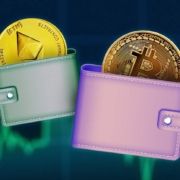The Best Crypto Wallet Apps with Built-In Exchange Features
As cryptocurrency adoption continues to grow, the demand for secure and user-friendly wallet apps has surged, especially those designed with built-in exchange features. These crypto wallet apps offer a seamless way to store, manage, and trade digital assets without switching platforms. For users and businesses alike, crypto wallet app development has become a key focus in delivering efficient and secure blockchain solutions.
By integrating exchange functionality directly into wallets, developers are creating more convenient, cost-effective tools that minimize security risks and simplify transactions. Whether you’re a seasoned trader or just entering the crypto space, choosing the right app can make all the difference.
In this guide, we explore the best crypto wallet apps with built-in exchange features to help you manage your digital assets more effectively.
Why Choose a Crypto Wallet with Built-In Exchange?
Choosing a wallet app with an integrated exchange saves time and effort. Instead of moving funds between multiple platforms, you can trade cryptocurrencies directly within the app. This reduces transaction times and sometimes lowers fees. Moreover, integrated wallets often provide real-time market data and instant swaps, making them a practical choice for active traders and casual holders alike.
Key Features to Look For in Crypto Wallet Apps
When selecting a wallet app with exchange capabilities, certain features stand out as essential.
Security and Privacy
A wallet must protect your funds and personal data. Look for apps that use strong encryption, private key control, and offer features like two-factor authentication or biometric access. Wallets that do not store private keys on servers offer greater security.
User Interface and Experience
A clean, intuitive interface makes managing your portfolio easier. The exchange process should be straightforward and fast, with clear steps and minimal delays.
Supported Cryptocurrencies
Choose wallets that support the coins you own or plan to buy. Broad support gives you more options when trading or managing your portfolio.
Exchange Fees and Rates
Fees can impact your returns. Pay attention to the fee structure and exchange rates offered. Some wallets partner with third-party exchanges to provide competitive rates.
Additional Functionalities
Extra tools like portfolio tracking, staking, or integration with decentralized finance (DeFi) platforms add value. These features can enhance how you interact with your assets.
Top Crypto Wallet Apps with Built-In Exchange
Here are some of the top crypto wallets that offer built-in exchange features, each with unique strengths.
1. Trust Wallet
Features
Trust Wallet supports thousands of cryptocurrencies and tokens across multiple blockchains. It lets users store, send, receive, and stake coins in a secure environment. As a product of advanced blockchain app development, the app offers a user-friendly interface suitable for both beginners and experienced users.
Exchange Capabilities
The wallet integrates with decentralized exchanges (DEXs) and supports instant swaps within the app. This setup allows users to convert assets without leaving the platform. Trust Wallet leverages protocols like Binance DEX and PancakeSwap to power its exchange functions.
Security Measures
Trust Wallet stores private keys locally on the user’s device, providing full control. The app does not hold any user funds or data on its servers. Biometric login adds an extra security layer.
2. Atomic Wallet
Features
Atomic Wallet supports over 500 coins and tokens, offering multi-currency management and staking options. It provides an easy-to-use interface with a built-in portfolio tracker.
Exchange Capabilities
Atomic Wallet includes a decentralized exchange mechanism that enables instant swaps between supported assets. The app connects to several liquidity providers to ensure competitive rates and reliable trades.
Security Measures
Users hold their private keys on their devices, reducing the risk of centralized breaches. Atomic Wallet also uses encryption to protect sensitive data and offers password protection.
3. Exodus Wallet
Features
Exodus Wallet offers a visually appealing interface and supports over 160 cryptocurrencies. It includes built-in portfolio tracking and integration with hardware wallets for enhanced security.
Exchange Capabilities
The app integrates with third-party exchange services, allowing users to swap cryptocurrencies directly. Trades execute quickly with transparent fees shown upfront.
Security Measures
Exodus stores private keys locally and gives users complete control. It does not require account creation or personal information, enhancing privacy.
4. Coinbase Wallet
Features
Coinbase Wallet functions independently from the Coinbase exchange but benefits from the company’s ecosystem. It supports a wide range of assets and enables users to access decentralized applications (dApps).
Exchange Capabilities
Users can swap tokens within the wallet using decentralized exchange protocols. Coinbase Wallet provides simple swap options backed by liquidity from multiple sources.
Security Measures
Private keys remain on the device. Coinbase Wallet offers biometric security options and integrates with Coinbase’s broader security infrastructure.
5. Guarda Wallet
Features
Guarda supports over 50 blockchains and more than 10,000 tokens. It offers multi-platform access, including mobile, desktop, and web.
Exchange Capabilities
Guarda’s built-in exchange connects users with multiple liquidity providers for fast swaps and competitive rates. The wallet supports cross-chain swaps and instant exchanges.
Security Measures
Private keys never leave the user’s device. Guarda encrypts wallet data and provides backup options to secure funds.
How to Choose the Right Wallet for Your Needs
Choosing the best wallet depends on your priorities. If you trade frequently, prioritize apps with fast, reliable exchange functions and low fees. For security-conscious users, wallets that keep keys fully under user control and avoid centralized storage are preferable. Consider supported coins, ease of use, and additional features like staking or portfolio management.
Tips for Using Crypto Wallets Safely
- Always back up your seed phrase and store it offline.
- Use strong, unique passwords and enable biometric security where possible.
- Update your wallet app regularly to patch vulnerabilities.
- Avoid public Wi-Fi when accessing your wallet.
- Verify addresses carefully before sending funds.
- Stay alert for phishing attempts and suspicious links.
Conclusion
Crypto wallet apps with built-in exchange features offer a convenient way to manage and trade digital assets in one place. Trust Wallet, Atomic Wallet, Exodus, Coinbase Wallet, and Guarda all provide solid options with different strengths in security, usability, and supported assets. Assess your needs carefully, and pick a wallet that helps you control your portfolio while keeping your funds safe. Managing cryptocurrency doesn’t have to be complicated—these apps make it straightforward to buy, sell, and hold assets securely.



